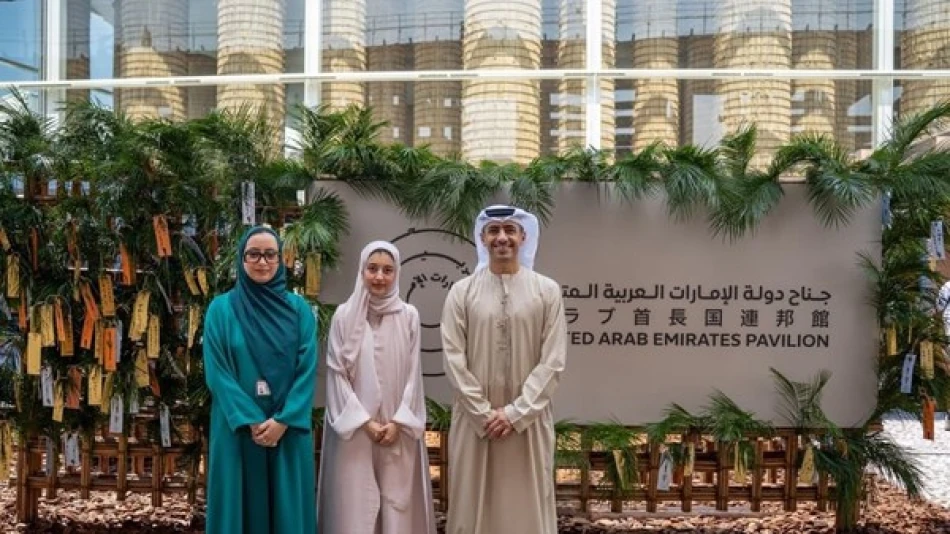
UAE Pavilion at Expo 2025 Osaka Welcomes Over 3 Million Visitors
UAE Pavilion at Expo 2025 Osaka Draws 3 Million Visitors, Showcasing Nation's Global Soft Power Strategy
The UAE's pavilion at Expo 2025 Osaka has welcomed three million visitors since the exhibition opened in mid-April, positioning itself as one of the most popular national showcases at the world fair. This milestone reflects the Emirates' sophisticated approach to cultural diplomacy and nation branding on the global stage, demonstrating how strategic participation in international forums can amplify a country's influence far beyond its geographic borders.
Cultural Diplomacy Through Immersive Storytelling
Operating under the theme "From Earth to Ether," the UAE pavilion offers visitors a multi-sensory journey through five thematic zones that chronicle the nation's evolution from its cultural heritage to its ambitious ventures in space exploration, healthcare innovation, and sustainable technologies. This narrative approach transforms what could be a traditional trade exhibition into an engaging cultural experience that resonates with diverse international audiences.
The pavilion's success lies in its ability to connect the UAE's ancient traditions with its futuristic aspirations. Visitors experience interactive installations that showcase the country's space program alongside traditional Emirati cuisine demonstrations, creating a compelling story of continuity and progress that many emerging economies struggle to articulate effectively.
Architectural Innovation Meets Sustainability Messaging
Designed by the international "From Earth to Ether" design consortium, the pavilion features 90 columns crafted from palm tree agricultural waste, directly inspired by the iconic date palm. This design choice serves multiple strategic purposes: it reinforces the UAE's environmental credentials, celebrates local heritage, and demonstrates innovative use of sustainable materials—all key themes in contemporary global discourse.
The architectural approach reflects a broader trend among Gulf nations to move beyond oil-focused narratives toward sustainability and innovation messaging. Similar to Saudi Arabia's NEOM project presentations or Qatar's World Cup sustainability initiatives, the UAE is leveraging high-profile international platforms to reshape global perceptions.
Repeat Visitation Signals Deeper Engagement
According to pavilion officials, many visitors return multiple times, suggesting the experience transcends typical expo browsing. This repeat engagement indicates successful emotional connection—a crucial metric for cultural diplomacy initiatives. Unlike traditional trade exhibitions focused on immediate commercial outcomes, the UAE's approach prioritizes long-term relationship building and brand association.
The pavilion hosts daily programming including expert dialogues, creative workshops, and live cultural performances, transforming the space into a dynamic cultural hub rather than a static display. This programming strategy mirrors successful approaches used by countries like Japan at previous expos, where continuous engagement creates lasting impressions.
Strategic Timing and Global Context
The UAE's strong showing at Expo 2025 comes as the country continues diversifying its economy and international image beyond oil dependence. With Expo 2020 Dubai still fresh in global memory, the Emirates is maintaining momentum in positioning itself as a bridge between East and West, tradition and innovation.
Ambassador Shehab Ahmed Al Fahim, UAE Ambassador to Japan and Commissioner General for the pavilion, emphasized the achievement reflects "global resonance" of UAE accomplishments across multiple sectors. This language suggests strategic messaging aimed at reinforcing the country's status as a reliable international partner and innovation hub.
Implications for Future International Engagement
The three million visitor milestone positions the UAE pavilion among the most successful national presentations at Expo 2025, likely influencing how other countries approach future international exhibitions. The success validates significant investment in cultural diplomacy and suggests strong returns on soft power initiatives.
As Expo 2025 continues until October 13, the UAE's approach provides a blueprint for how mid-sized nations can leverage international platforms to project influence and build relationships that extend far beyond traditional diplomatic channels. The pavilion's success demonstrates that in an increasingly connected world, cultural engagement often proves more valuable than conventional trade promotion.
Most Viewed News

 Layla Al Mansoori
Layla Al Mansoori






